|
|
|
Sort Order |
|
|
|
Items / Page
|
|
|
|
|
|
|
| Srl | Item |
| 1 |
ID:
167625
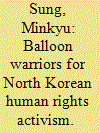

|
|
|
|
|
| Summary/Abstract |
While the identity politics of North Korean defector-activists at home and abroad is revealed by unraveling the discursive complexity of their activism, little attention has been paid to the way in which that activism compromises the discursive dynamic of the defector community desiring to contest the power of a ruling paradigm within political culture. A critical analysis of North Korean defector balloon warriors who have crusaded against the North Korea regime through airborne leaflet drops at the South–North Korea border illustrates how their uncritical and unquestioned acceptance of liberal human rights can only leave the defector community vulnerable to charges of being politically-futile disparate citizens. The invocations of transnational liberal hegemonic norms obscure and undermine North Korean defectors’ agency of collective engagement in acts of liberal democratic citizenship. Understanding the propagandistic dimension of their dissenting voices can help expand the scope of analysis of liberal democratic posthumanitarian citizenship.
|
|
|
|
|
|
|
|
|
|
|
|
|
|
|
|
| 2 |
ID:
167626


|
|
|
|
|
| Summary/Abstract |
State control of land plays a critical role in producing land dispossession throughout the Global South. In Myanmar, the state’s approach towards territorial expansion has driven the country’s system of land governance, resulting in widespread and systemic land grabbing. This article investigates ongoing land governance reforms as key terrains for contesting such abuses of power. Employing a relational land governance approach, we view reform processes as shaped by changing power-laden social relations among government, civil society, and international donor actors. Legal and regulatory reforms in Myanmar potentially act as sites of meaningful social change but in practice tend to maintain significant limitations in altering governance dynamics. Civil society organizations and their alliances in Myanmar have played an important role in opening up policy processes to a broader group of political actors. Yet, policies and legal frameworks still are often captured by elite actors, becoming trapped in path dependent power relations.
|
|
|
|
|
|
|
|
|
|
|
|
|
|
|
|
| 3 |
ID:
167631
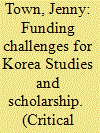

|
|
|
| 4 |
ID:
167623
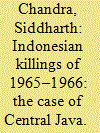

|
|
|
|
|
| Summary/Abstract |
The mass killings of 1965–1966 in Indonesia marked a watershed in its history. The consensus estimate of lives lost is 500,000. In this paper, demographic and geographic methods are used to characterize the violence in Central Java, one of the worst-affected provinces. The findings provide a portrait of the violence and its dynamics. This portrait highlights the likely complicity of a diverse array of political opponents of the Indonesian Communist Party (PKI). The findings also provide evidence supporting Clifford Geertz's three-aliran (cultural “stream”) model of Javanese society, with the complex interplay of the three aliran and the Indonesian Army in the political realm producing the violent outcomes of 1965–1966. In this manner, this study builds on prior work by Hefner, Jay, Lyon, Mortimer, and Ricklefs on the cultural and social underpinnings of the violence. It also builds on more recent work on the neighboring province of East Java in which the role of two of the three alirans was found to be a significant factor, underlining the importance of the intersection of culture, geography, and politics in understanding this violent episode in Indonesian history.
|
|
|
|
|
|
|
|
|
|
|
|
|
|
|
|
| 5 |
ID:
167632


|
|
|
| 6 |
ID:
167629


|
|
|
| 7 |
ID:
167624


|
|
|
|
|
| Summary/Abstract |
Japan faces a large and rapidly growing care labor shortage. A common assumption is that the government has a choice between alternatives that will shape the future of its institutional elderly care provision: increase the number of migrant caregivers, or use robots and other emergent technologies to substitute for human carers. This article, based on data from seven months’ ethnographic fieldwork at an elderly care home in Japan that was introducing three different types of care robot, challenges this binary framing. The introduction of these robots served to reconfigure care – increasing the amount of work tasks for human caregivers, deskilling aspects of care labor, and raising overall costs. The robots displaced rather than replaced human labor, recalibrating the distance between carers and recipients of care. While such devices may have been intended by politicians and engineers to solve Japan’s care crisis by replacing human caregivers, the reality of robot use makes this unlikely in the foreseeable future. Yet by reconfiguring care and helping overcome linguistic and cultural barriers – rendering it “culturally odorless” – robots may facilitate the introduction of migrant caregivers at the cost of the further precaritization, commodification, and devaluation of care work.
|
|
|
|
|
|
|
|
|
|
|
|
|
|
|
|
| 8 |
ID:
167633


|
|
|
|
|
| Summary/Abstract |
This article examines the use of North Korean defectors’ accounts as a source of information for studying the Democratic People’s Republic of Korea (DPRK). Information from defectors fills a vital knowledge gap and improves our understanding of North Korean politics, economics, and society. Witness accounts and interview data collected from people who were born in North Korea but have since left have been widely used by journalists, government agencies, international organizations, non-governmental organizations, and academics. There are, however, serious methodological issues in collecting, organizing, and interpreting information derived from defectors’ accounts. Selection and demographic biases, power relations between researchers and interviewees, monetary incentives, and language barriers are among those issues. We propose focus group discussions and participatory observation as complementary methods of data collection to mitigate the shortfalls of relying on individual interviews.
|
|
|
|
|
|
|
|
|
|
|
|
|
|
|
|
| 9 |
ID:
167628
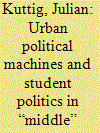

|
|
|
|
|
| Summary/Abstract |
In response to the mostly Dhaka-centered research on student politics in Bangladesh, this article aims to understand political competition, the role of patronage networks, political organizations, violence, and student organizations in the provincial city of Rajshahi. The article explores how student politics in Bangladesh shapes (and is shaped by) the political dynamics in “middle Bangladesh.” Student groups in Bangladesh are closely affiliated to political parties and serve as their most important source for mobilization in a party-political regime commonly referred to as a “partyarchy.” Campus politics is deeply integrated into the urban party-political machine in Rajshahi. Controlling Rajshahi University (RU) provides a steady flow of party workers for the local party machine. Thus, the RU campus is a space for organizing political (and violent) labor as well as an important source of revenue for and the distribution of benefits by local party bosses. The urban party machine, however, is not mechanically held together merely by the dispensation of inducements – instead, it is more chaotic and contingent on a form of strategic ambiguity that disguises the structuring effects of patronage power that keeps members motivated and engaged.
|
|
|
|
|
|
|
|
|
|
|
|
|
|
|
|
| 10 |
ID:
167627
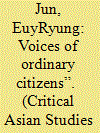

|
|
|
|
|
| Summary/Abstract |
This article looks at the rapid emergence of ban damunhwa (“anti-multiculture”) or the sentiment of anti-immigration in South Korea. Ban damunhwa discourse centers on a variety of issues such as the state's multicultural policy, crimes by foreigners, and problems of the so-called illegal sojourners, and has been most active and visible on the Internet, especially since the mid-2000s. This article focuses on the way ban damunhwa defines the state's multicultural policy as what gives special preferences to migrants, which, in turn, is said to destroy the livelihoods of South Korean citizens. Represented as the “voices of ordinary citizens,” ban damunhwa narratives appeal to a neoliberal idea of fairness and equity, under which migrants emerge as demonic free-riders. Ban damunhwa discourse not only serves as a symptom of a neoliberal ethic but also mirrors the dilemma of the people who struggle within a system of precarity and yet reproduce its main ideologies.
|
|
|
|
|
|
|
|
|
|
|
|
|
|
|
|
| 11 |
ID:
167630


|
|
|
|
|
|
|
|